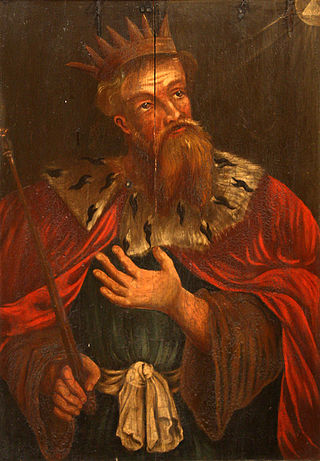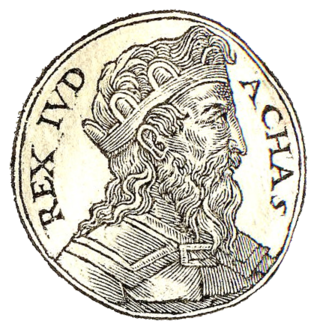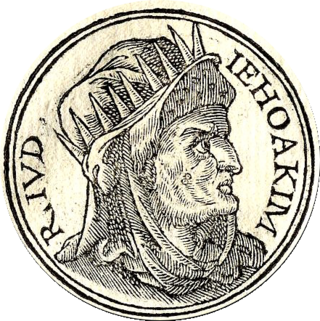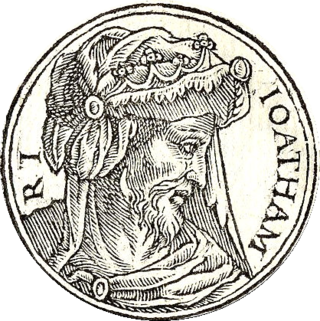The Book of Kings is a book in the Hebrew Bible, found as two books in the Old Testament of the Christian Bible. It concludes the Deuteronomistic history, a history of ancient Israel also including the books of Joshua, Judges, and Samuel.

Hezekiah, or Ezekias, was the son of Ahaz and the thirteenth king of Judah according to the Hebrew Bible.

Isaiah was the 8th-century BC Israelite prophet after whom the Book of Isaiah is named.

Omri was, according to the Hebrew Bible, the sixth king of Israel. He was a successful military campaigner who extended the northern kingdom of Israel. Other monarchs from the House of Omri are Ahab, Ahaziah, Joram, and Athaliah. Like his predecessor, king Zimri, who ruled for only seven days, Omri is the second king mentioned in the Bible without a statement of his tribal origin. One possibility, though unproven, is that he was of the tribe of Issachar.

Ahaz an abbreviation of Jehoahaz II, "Yahweh has held" was the twelfth king of Judah, and the son and successor of Jotham. Ahaz was 20 when he became king of Judah and reigned for 16 years.

Hoshea was the nineteenth and last king of the northern Kingdom of Israel and son of Elah. William F. Albright dated his reign to 732–721 BCE, while E. R. Thiele offered the dates 732–723 BCE.

Jehoiakim, also sometimes spelled Jehoikim was the eighteenth and antepenultimate King of Judah from 609 to 598 BC. He was the second son of King Josiah and Zebidah, the daughter of Pedaiah of Rumah. His birth name was Eliakim.

Jotham or Yotam was the eleventh king of Judah, and son of Uzziah and Jerusha, daughter of Zadok. Jotham was 25 years old when he began his reign, and he reigned for 16 years. Edwin R. Thiele concluded that his reign commenced as a coregency with his father, which lasted for 11 years. Because his father Uzziah was afflicted with tzaraath after he went into the Temple to burn incense, Jotham became governor of the palace and the land at that time, i.e. coregent, while his father lived in a separate house as a leper.

Manasseh was the fourteenth king of the Kingdom of Judah. He was the oldest of the sons of Hezekiah and Hephzibah. He became king at the age of 12 and reigned for 55 years.

Josiah or Yoshiyahu was the 16th King of Judah. According to the Hebrew Bible, he instituted major religious reforms by removing official worship of gods other than Yahweh. Until the 1990s, the biblical description of Josiah’s reforms were usually considered to be more or less accurate, but that is now heavily debated. According to the Bible, Josiah became king of the Kingdom of Judah at the age of eight, after the assassination of his father, King Amon and reigned for 31 years, from 641/640 to 610/609 BCE.

Asa was, according to the Hebrew Bible, the third king of the Kingdom of Judah and the fifth king of the House of David. Based on the Biblical chronology, Biblical scholars suggest that he reigned from the late 10th to early 9th century BCE. He was succeeded by Jehoshaphat, his son. According to Edwin R. Thiele's chronology, when Asa became very ill, he made Jehoshaphat coregent. Asa died two years into the coregency.

The Kings of Judah were the monarchs who ruled over the ancient Kingdom of Judah, which was formed in about 930 BC, according to the Hebrew Bible, when the United Kingdom of Israel split, with the people of the northern Kingdom of Israel rejecting Rehoboam as their monarch, leaving him as solely the King of Judah.

Matthew 1:10 is the tenth verse of the first chapter in the Gospel of Matthew in the Bible. The verse is part of the section where the genealogy of Joseph, the father of Jesus, is listed.

2 Kings 18 is the eighteenth chapter of the second part of the Books of Kings in the Hebrew Bible or the Second Book of Kings in the Old Testament of the Christian Bible. The book is a compilation of various annals recording the acts of the kings of Israel and Judah by a Deuteronomic compiler in the seventh century BCE, with a supplement added in the sixth century BCE. This chapter records the events during the reign of Hezekiah, the king of Judah, a part of the section comprising 2 Kings 18:1 to 20:21, with a parallel version in Isaiah 36–39.

2 Kings 19 is the nineteenth chapter of the second part of the Books of Kings in the Hebrew Bible or the Second Book of Kings in the Old Testament of the Christian Bible. The book is a compilation of various annals recording the acts of the kings of Israel and Judah by a Deuteronomic compiler in the seventh century BC, with a supplement added in the sixth century BC. This chapter records the invasion of Assyrian to Judah during the reign of Hezekiah, the king of Judah, a part of the section comprising 2 Kings 18:1 to 20:21, with a parallel version in Isaiah 36–39.

2 Kings 20 is the twentieth chapter of the second part of the Books of Kings in the Hebrew Bible or the Second Book of Kings in the Old Testament of the Christian Bible. The book is a compilation of various annals recording the acts of the kings of Israel and Judah by a Deuteronomic compiler in the seventh century BCE, with a supplement added in the sixth century BCE. This chapter records the events during the reign of Hezekiah and Manasseh, the kings of Judah.

2 Kings 15 is the fifteenth chapter of the second part of the Books of Kings in the Hebrew Bible or the Second Book of Kings in the Old Testament of the Christian Bible. The book is a compilation of various annals recording the acts of the kings of Israel and Judah by a Deuteronomic compiler in the seventh century BCE, with a supplement added in the sixth century BCE. This chapter records the events during the reigns of Azariah (Uzziah) and his son, Jotham, the kings of Judah, as well as of Zechariah, Shallum, Menahem, Pekahiah and Pekah, the kings of Israel. Twelve first verses of the narrative belong to a major section 2 Kings 9:1–15:12 covering the period of Jehu's dynasty.

2 Kings 21 is the twenty-first chapter of the second part of the Books of Kings in the Hebrew Bible or the Second Book of Kings in the Old Testament of the Christian Bible. The book is a compilation of various annals recording the acts of the kings of Israel and Judah by a Deuteronomic compiler in the seventh century BCE, with a supplement added in the sixth century BCE. This chapter records the events during the reign of Manasseh and Amon, the kings of Judah.

2 Chronicles 33 is the thirty-third chapter of the Second Book of Chronicles the Old Testament of the Christian Bible or of the second part of the Books of Chronicles in the Hebrew Bible. The book is compiled from older sources by an unknown person or group, designated by modern scholars as "the Chronicler", and had the final shape established in late fifth or fourth century BCE. This chapter belongs to the section focusing on the kingdom of Judah until its destruction by the Babylonians under Nebuchadnezzar and the beginning of restoration under Cyrus the Great of Persia. It contains the regnal accounts of Manasseh and Amon, the kings of Judah.















